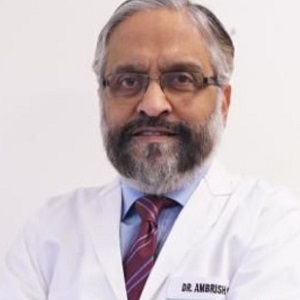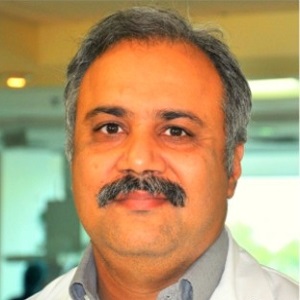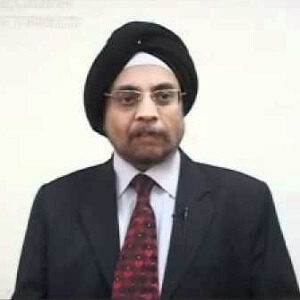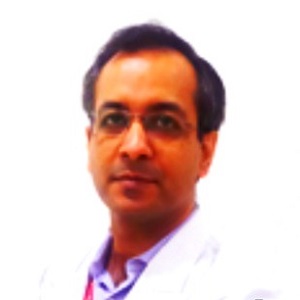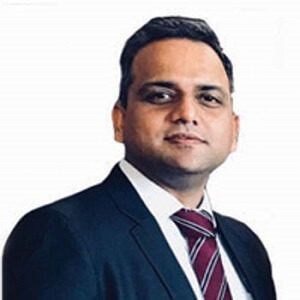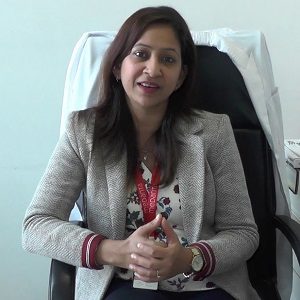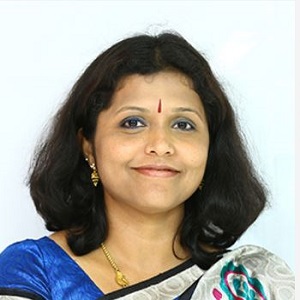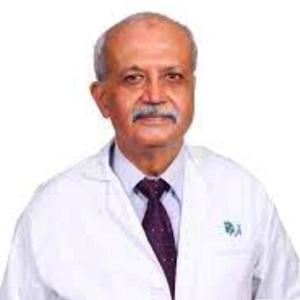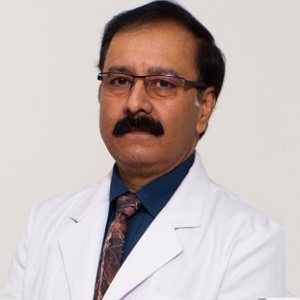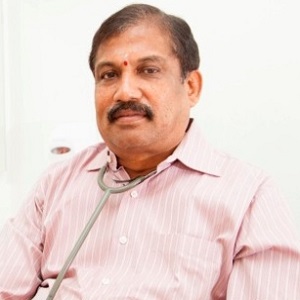Best Doctors in India for Pheochromocytoma Treatment
- Top Endocrinologist & Diabetologist | Max Hospital, Saket, New Delhi, India
- 40+ Years Experience
- Max Super Specialty Hospital, Saket, New Delhi
Profile Highlights:
- Dr. Ambrish Mithal is a leading Endocrinologist and the Chairman and Head of Endocrinology and Diabetes at Max Super Speciality Hospital, Saket, New Delhi, where he has been working since December 2019.
- With a distinguished career spanning over three decades, Dr. Mithal is recognized as a top expert in Endocrinology.
- Before joining Max Healthcare, he served as the Chairman of the Division of Endocrinology and Diabetes at Medanta – The Medicity from 2009 to 2019. He has also held senior positions at Apollo Hospital, New Delhi, and Sanjay Gandhi Post Graduate Institute of Medical Sciences, Lucknow.
- Endocrinologist, Gurugram, India
- Over 20 years’ experience
- Artemis Hospital, Gurgaon
Profile Highlights:
- Dr. Dheeraj Kapoor is a renowned Endocrinologist based in New Delhi. He currently serves as the Chief of Endocrinology at Artemis Hospital in Gurugram.
- With a solid educational background including an MD in Medicine from Dayanand Medical College and Hospital, Ludhiana, and a DM in Endocrinology from the Institute of Medical Sciences, Banaras Hindu University, Varanasi, Dr. Kapoor brings a wealth of expertise to his role.
- He specializes in managing and treating complications arising from diabetes, including those affecting the cardiovascular system, kidneys, nerves, and eyes. His comprehensive approach ensures that all aspects of diabetes-related health issues are addressed effectively.
- Top Pediatric Endocrinologist and Diabetologist | Apollo Hospital, New Delhi, India
- 36+ Years Experience
- Indraprastha Apollo Hospital, New Delhi
Profile Highlights:
- Dr. I P S Kochar is one of the finest Pediatric Endocrinologists in India, having over 36 years of experience in endocrinology. He is a Senior Consultant in Pediatric and Adolescent Endocrinology and Diabetology, currently serving at Indraprastha Apollo Hospital in New Delhi.
- Dr. Kochar specializes in the treatment of Growth disorders, metabolic disease, Dyslipidemia, Thyroid Disorders, Osteoporosis, Jaundice, and other Endocrinology problems in children and adolescents. One can also consult Dr. Kochar for weight & height and diabetes management.
- With an impressive educational background, including an MD, MAMS from Vienna, MRCPCH from London, and a fellowship in Pediatric Endocrinology from Great Ormond Street Hospital in London, Dr. Kochar is a leading expert in his field.
- Endocrinologist & Diabetologist, Gurugram, India
- Over 26 years’ experience
- Medanta-The Medicity, Gurgaon
Profile Highlights:
- Dr. Manish Gutch is a highly skilled Endocrinologist with deep expertise in Diabetes & Metabolism, Osteoporosis, Menopause, and Hormonal Disorders. His journey in medicine is marked by a series of impressive achievements and a commitment to providing top-notch care.
- He is presently working at Medanta Hospital as the Director of the Endocrinology department.
- Dr. Gutch’s extensive training and expertise make him a leading figure in his field, where he continues to make significant contributions to patient care and the broader medical community.
- Top Endocrinologist and Diabetologist | Apollo Hospital, New Delhi, India
- 26+ Years Experience
- Indraprastha Apollo Hospital, New Delhi
Profile Highlights:
- Dr. Mohammad Asim Siddiqui is a highly regarded Endocrinologist based in New Delhi, India. He has an experience of over 26 years in the field. Currently, he is associated with Indraprastha Apollo Hospital, New Delhi as a Consultant Endocrinologist.
- Dr. Siddiqui specializes in Internal Medicine & manages Diabetes, Endocrine and Metabolic Disorders.
- His interest in Diabetes mainly focuses on young and gestational diabetes & Post-transplant & post-metabolic surgery diabetes.
- Dr. Siddiqui is also involved in various clinical research and has penned more than 50 articles in national and international journals.
- Associate Director Endocrinology & Diabetology, Gurugram, India
- Over 10 years’ experience
- Medanta-The Medicity, Gurgaon
Profile Highlights:
- Dr. Parjeet Kaur is an expert in treating patients with endocrine disorders, especially, diabetes, thyroid, and parathyroid disorders, PCOS, and obesity.
- Dr. Parjeet Kaur is being actively involved in extensive research and practice of Endocrinology and the sub specialties.
- Top Endocrinologist & Diabetologist | Rela Hospital, Chennai, India
- 14+ Years Experience
- Dr. Rela Institute & Medical Centre
Profile Highlights:
- Dr. Chandrasekaran currently serves as a Senior Consultant Endocrinologist and Diabetologist at the Rela Institute of Medical Science in Chennai, where she continues to provide exceptional care and advance her field.
- With a comprehensive academic background including MBBS, ABIM, and AB in Endocrinology, Diabetology & Metabolism, Dr. Chandrasekaran has developed a robust specialization in managing pituitary, adrenal, and gonadal disorders.
- Top Endocrinologist and Diabetologist | Apollo Hospital, New Delhi, India
- 40+ Years Experience
- Indraprastha Apollo Hospital, New Delhi
Profile Highlights:
- Dr. C M Batra is currently associated as a Senior Consultant with the Department of Endocrinology at Indraprastha Apollo Hospitals, New Delhi
- He specializes in Diabetic, Thyroid, Obesity, Reproductive Disorder, Bone and Metabolism
- Dr. Batra is a member of RSSDI, Endocrine Society of India, and the American Endocrine Society
- Endocrinologist & Diabetologist, Gurugram, India
- Over 35 years’ experience
- Fortis Memorial Research Institute
Profile Highlights:
- Dr. Atul Luthra is a senior consultant in the arena of diabetes and other endocrine disorders.
- He is an excellent teacher and author. He is widely known for delivering guest lectures at various state and national level conferences.
- Dr. Luthra is a prolific speaker and orator, who has a special contribution to diabetes outreach in India.
- Endocrinologist & Diabetologist, Chennai, India
- Over 43 years’ experience
- Apollo Hospitals Greams Road
Profile Highlights:
- Dr. Rajendiran N holds an experience of more than 4 decades and expertise in diabetic consulting for chronic patients.
- Dr. Rajendiran specializes in Gestational Diabetes, Type 1 Diabetes and Type 2 Diabetes.
- He is the secretary of the Diabetes Association of India (Southern Chapter) and Founder President of Madras Medical College Diabetes Alumni Association.
Best Hospitals in India for Pheochromocytoma Treatment
- City: Gurugram, India
Hospital Highlights:
- One of India’s best and largest multi-specialty hospitals, Medanta was built with the aim to bring India to the highest standards of medical care. The hospital has been providing the best medical services to its patients, since its inception, with care, commitment, and compassion.
- Equipped with 1250 beds, the hospital was founded by Dr. Naresh Trehan in the year 2009 with an aim to provide the best medical care at affordable costs. The hospital is spread across 43 acres and includes 45 operation theatres and 350 beds dedicated solely to ICU. The hospital includes over 800 doctors, and more than 22 specialty departments and has a dedicated floor for individual specialty in order to offer the best services under one roof.
- The hospital is considered one of the premier institutes in India for Cardiac Care and includes staffs and members of high caliber. The hospital has 6 distinct centers of excellence.
- City: Gurugram, India
Hospital Highlights:
- Artemis Hospital, established in 2007 in Gurugram, India, is a leading multi-specialty institution known for its excellence in patient care and advanced medical technology, offering comprehensive services across specialties like Cardiology, Oncology, Neurology, Orthopedics etc.
- Renowned for its patient-focused care, Artemis Hospital combines state-of-the-art infrastructure with a team of internationally trained doctors and surgeons, ensuring the highest standards of medical treatment.
- Accredited by JCI and NABH, Artemis Hospital meets global healthcare quality and safety standards, reflecting its commitment to providing compassionate, personalized care.
- The hospital is recognized for utilizing cutting-edge diagnostic and ther*peutic techniques, ensuring patients receive accurate diagnoses and effective treatments tailored to their needs.
- City: Chennai, India
Hospital Highlights:
- The Apollo Proton Cancer Centre in Chennai is the most sought-after private cancer hospital in India. It is an integrated facility that provides cutting-edge, all inclusive cancer treatment to patients all over the globe.
- The hospital is a part of the renowned Apollo Group which has a large network of over 74 hospitals in India and across the globe. Out of the 74 hospitals, 21 of them are cancer centres. However, Apollo Proton Cancer Centre is the only cancer hospital to have JCI accreditation.
- The Centre, which was established on the principles of excellence and expertise, unites a formidable medical staff led by some of the most illustrious figures in cancer treatment.
- The hospital follows the global ASTRO Model Policy. It is the same global policy which is followed by countries like USA, UK, and Europe.
- Apollo Proton Cancer Centre is among the very few hospitals in India to receive patients from First World countries such as USA, Canada, New Zealand, Australia, Singapore, Thailand, etc.
- Apart from that, it is also the first hospital in Chennai to receive patients from several countries like Uzbekistan, Kazakhstan, Turkmenistan, Georgia, Armenia, Azerbaijan, SAARC countries (Bangladesh, Nepal, Sri Lanka, Maldives, Bhutan, Afghanistan, and Pakistan), South Africa, Turkey, Egypt, etc.
- In fact, there is a dedicated team at the Apollo Proton Cancer Centre that serves only international patients. Thus, on a monthly basis, the Centre receives patients from across 32 countries.
- Moreover, there are certain treatments in Apollo Proton Cancer Centre that are not available in any other centre. APCC addresses all types of possible cancers that are usually not covered by any other centre.
- City: New Delhi, India
Hospital Highlights:
- Over the last 33 years, the Fortis Escorts Heart Institute has set new standards in cardiac treatment with groundbreaking research. It is now known around the world as a centre of expertise for Cardiac Bypass Surgery, Interventional Cardiology, Non-invasive Cardiology, Paediatric Cardiology, and Paediatric Cardiac Surgery.
- The hospital has cutting-edge laboratories that perform a wide range of diagnostic tests in Nuclear Medicine, Radiology, Biochemistry, Haematology, Transfusion Medicine, and Microbiology.
- Fortis Escorts Heart Institute boasts a diverse group of bright and experienced doctors who are backed up by a team of highly qualified, experienced, and devoted support professionals as well as cutting-edge equipment such as the recently installed Dual CT Scan.
- Approximately 200 cardiac doctors and 1600 personnel currently collaborate to manage over 14,500 admissions and 7,200 emergency situations each year. The hospital now has a 310-bed infrastructure, as well as five cath labs and a slew of other world-class amenities.
- City: Gurugram, India
Hospital Highlights:
- Fortis Memorial Research Institute (FMRI) is a premier multi-super-specialty, quaternary care hospital, known for its exceptional international faculty, top-tier clinicians, super-sub-specialists, and specialized nurses, all supported by cutting-edge technology.
- It is the flaship hospital of Fortis Healthcare Limited, part of IHH Healthcare Berhad, a leading integrated healthcare services provider in India. As one of the country’s largest healthcare organizations, Fortis operates 28 healthcare facilities with over 4,500 operational beds (including O&M facilities) and more than 400 diagnostic centers (including joint ventures).
- Recognized as one of the top hospitals in India, FMRI serves as a leading referral center and aspires to be the ‘Mecca of Healthcare’ for India and beyond. Its 11-acre campus is a testament to its commitment to providing world-class healthcare.
- Accredited by JCI and NABH, FMRI is dedicated to maintaining the highest standards of healthcare quality and safety, ensuring that every patient receives the best possible care. The hospital’s reputation is further enhanced by its state-of-the-art facilities and innovative medical practices.
- City: New Delhi, India
Hospital Highlights:
- The Indian Spinal Injuries Center (ISIC), provides state-of-the-art facilities for the management of all types of spinal ailments.
- Staffed with internationally trained, acclaimed, and dedicated spine surgeons, the hospital provides cutting-edge medical & surgical technology. The hospital provides comprehensive management of spinal injury, back pain, spinal deformities, tumors, osteoporosis, etc.
- The hospital performs motion-preserving spine surgeries including disc replacement and dynamic fixation, and minimally invasive spine surgeries such as endoscopic disc excision.
- The orthopedic service of the hospital covers all orthopedic ailments including trauma, joint diseases & replacements, oncology, pediatric orthopedics & upper limb ailment.
- City: Faridabad
Hospital Highlights:
In the sprawling city of Faridabad, where healthcare needs are diverse and ever-evolving, one institution has consistently stood out as a beacon of excellence in the field of medicine—Marengo Asia Hospital. Established with a vision to provide world-class healthcare services to the community it serves, Marengo Asia Hospital has emerged as a trusted name synonymous with quality, compassion, and innovation in healthcare.
- City: New Delhi, India
Hospital Highlights:
- Indraprastha Apollo Hospital is a 700-bedded multispecialty hospital in the heart of the capital of India. It is a part of Apollo Hospital group, one of India’s most reputed healthcare chains. Indraprastha Apollo Hospital has been accredited by Joint Commission International, making it the first internationally accredited hospital in the country in 2005.
- There are 52 specialties in the hospital with one of the best cardiology centers in the country. The hospital is also equipped with State of the art infrastructure facilities with the largest Sleep Lab in Asia and the largest number of ICU bed facilities in India.
- The latest and highly advanced technologies that are installed in the hospital include Da Vinci Robotic Surgery System, PET-MR, PET-CT, Cobalt-based HDR, Brain Lab Navigation System, Tilting MRI, Portable CT scanner, 3 Tesla MRI, 128 Slice CT scanner, DSA Lab, Endosonography, Hyperbaric Chamber and Fibro scan.
- City: New Delhi, India
Hospital Highlights:
- One of the well-regarded providers in India committed to the highest standards of clinical excellence and patient care, Max Super Specialty Hospital is a part of Max Healthcare, which is the second-largest healthcare chain in India. Regarded as one of the most well-regarded healthcare providers in the country, Max Super Specialty Hospital is committed to the highest standards of clinical excellence as well as patient care. The hospital is also equipped with the latest technology as well as cutting-edge research. The hospital is known to deliver and ensure the highest level of patient care.
- The hospital has more than 500 beds and offers treatment for over 35 specialties. The hospital also holds the credit of having installed the first Brain Suite in Asia. This is a highly advanced Neurosurgical machine that allows MRI to be taken while surgery is ongoing.
- Other advanced and latest technologies are also installed in the hospital such as the 1.5 Tesla MRI machine, 64 Slice CT Angiography, 4D ECHO, LINAC, and 3.5T MRI machine.
- City: Kolkata, India
Hospital Highlights:
- Founded in 2017, the HCG EKO Cancer Centre is a committed, all-inclusive cancer care facility in Kolkata.
- The hospital was collaboratively established by India’s leading cancer care provider HCG (HealthCare Global Enterprises Ltd.), and EKO Diagnostic Pvt. Ltd., a top diagnostic and imaging chain in Eastern India.
- With 88 beds, the hospital provides a full spectrum of services including diagnosis, prevention, screening, second opinions, treatment, rehabilitation, follow-up, and palliative care.
- Additionally, the hospital contains a day-care chemotherapy ward, Neutropenic ward, medical ICU, pharmacy, blood bank, and an IPD wing.
- At HCG EKO Cancer Centre Kolkata, a large team of cancer experts with experience in medical oncology, surgical oncology, radiation oncology, hemato oncology, BMT, and nuclear medicine collaborate to offer a variety of treatment options under one roof.
- Furthermore, the hospital is also known for employing the most advanced radiation technology such as, the Radixact, a next-generation TomoTherapy equipment that provides greater radiation delivery precision.
Pheochromocytoma
Pheochromocytoma is a rare type of tumor that usually grows in the adrenal glands, above the kidneys. It is also known as an adrenal paraganglioma or a chromaffin cell tumor. It is generally common in adults between the ages of 30 to 50, though people of all ages might have it. Ten percent of all cases are known to occur among children.
Your adrenal glands produce hormones for controlling things like your metabolism and your blood pressure. A pheochromocytoma releases hormones as well, at much higher levels than normal. These extra hormones can lead to high blood pressure, and this might lead to damage to several of your organs, such as your brain, heart, lungs, and kidneys.
Though most pheochromocytoma tumors are benign, around 10 to 15 percent of them are generally cancerous, and they might spread to other parts of the body.
Symptoms
People having these tumors suffer from high blood pressure all the time. For others, it can go up and down.
Most people also have at least one or more of the following symptoms:
- Constipation
- Dizziness while standing
- Pale skin
- Fast or uneven heartbeat
- Severe headache
- Nausea
- Tremors
- Shortness of breath
- Unusual sweating
- Stomach, side, or back pain
- Vomiting
- Weakness
- Anxiety attacks
- Unintended weight loss
These symptoms can occur suddenly, like an attack, multiple times during a day. For some people, they might occur only a few times a month. As the tumor grows, the attacks can get stronger and might occur more often.
In some people, the attacks might be triggered by certain things such as:
- Pressure on the tumor
- Massage
- Certain medications
- Physical activity
- Childbirth
- Surgery
- Too much emotional stress
- Foods containing excessive amino acid tyramine, such as red wine, chocolate, or cheese
Causes & risk factors
Researchers are still unsure of what exactly is the cause of pheochromocytoma. This tumor develops in specialized cells, which are termed chromaffin cells, located in the center of an adrenal gland.
These cells release certain hormones, primarily adrenaline, and noradrenaline that helps to control several body functions, such as heart rate, blood pressure as well as blood sugar.
Adrenaline and noradrenaline trigger your body’s fight-or-flight response when a threat is perceived. The hormones can cause your blood pressure to increase as well as your heart to beat faster. They also prepare other body systems in order to help enable you to react quicker. A pheochromocytoma causes more of these hormones to be released even when you’re not in a threatening situation.
People having certain rare inherited disorders are at an increased risk of pheochromocytoma or paraganglioma. It is also likely that tumors associated with these disorders will be cancerous.
These genetic conditions include the following:
Multiple endocrine neoplasias, type 2 (MEN 2) – This disorder results in tumors in more than a single part of the body’s hormone-producing (endocrine) system. Other tumors which are associated with this condition may appear on the thyroid, tongue, parathyroid, lips, as well as the gastrointestinal tract.
Neurofibromatosis 1 (NF1) – This can result in multiple tumors in the skin, pigmented skin spots as well as tumors of the optic nerve.
Von Hippel-Lindau disease – This disorder can result in tumors at multiple sites, which can include the central nervous system, endocrine system, pancreas as well as kidneys.
Hereditary paraganglioma syndromes – These are inherited disorders which may result in paragangliomas or pheochromocytomas.
Diagnosis
Your doctor might require multiple tests for diagnosing this condition. These can include the following:
- PET imaging
- MRI
- Blood plasma test for catecholamine and metanephrine levels
- Laboratory tests in order to assess the hormone levels
- Urine metanephrines test for catecholamine and metanephrine levels
Treatment
Generally, the primary treatment for pheochromocytoma is surgery for removing the tumor. However, before you go for surgery, your doctor should likely recommend certain blood pressure medications. These are meant to block the actions of the high-adrenaline hormones and to lower the risk of developing extreme high blood pressure.
You will likely receive few drugs which can include alpha-blockers, for improving blood flow and decreasing blood pressure and beta-blockers, to make your heart beat slowly with less force.
It is also likely that your healthcare team will instruct you to consume a high-salt diet. These medications can cause a huge drop in your blood pressure; a high-salt diet will help you draw more fluid inside the blood vessels, and prevent you from having low blood pressure during and after the surgery.
Surgery
During the surgery, in most cases, the surgeon removes the entire adrenal gland with a pheochromocytoma using minimally invasive surgery. For this, your surgeon will need to create a few tiny openings through which he/she will insert wandlike devices equipped with video cameras and small tools.
The remaining healthy adrenal gland is able to carry out the functions normally performed by two. Blood pressure will likely return to normal within a short time.
If the other adrenal gland has been removed, then during the surgery, your doctor will remove only the tumor, and spare some of the healthy tissue.
If a tumor is cancerous, the tumor and other cancerous tissues are going to be removed. However, even if all of the cancerous tissues are not removed, surgery might limit the production of hormones. It also helps in providing some control over the blood pressure.
Cancerous pheochromocytoma treatments
Certains pheochromocytomas are also cancerous. And therefore, other treatments can be required for them, such as:
MIBG
This is a special kind of radiation therapy. It combines MIBG, a compound that attaches to the adrenal tumors, with a type of radioactive iodine. The goal of the treatment is to deliver radiation therapy to a specific site and eliminate the cancerous cells.
Chemotherapy
Chemotherapy involves using powerful drugs for killing fast-growing cancer cells.
Radiation therapy
This treatment might be used for symptomatic treatment of tumors that have spread to other parts of the body and causing pain.
Targeted cancer therapies
Peptide receptor radionuclide therapy (PRRT)
PRRT combines a drug that targets cancer cells with a small amount of a radioactive substance. It allows radiation to be delivered to the cancer cells directly.
People having pheochromocytoma which is not cancerous generally have a 5-year survival rate of 96 percent, while for people with a cancerous tumor, the survival rate is 44 percent.
For ensuring successful treatment, an early diagnosis is not always enough. It is best that you seek out a surgeon who is highly skilled and experienced.
Complications
High blood pressure caused by the tumors can cause damage to various organs, especially tissues of the cardiovascular system, brain, or even the kidneys. Some of the critical conditions include the following:
- Heart disease
- Kidney failure
- Problems with the nerves of the eye
- Stroke

